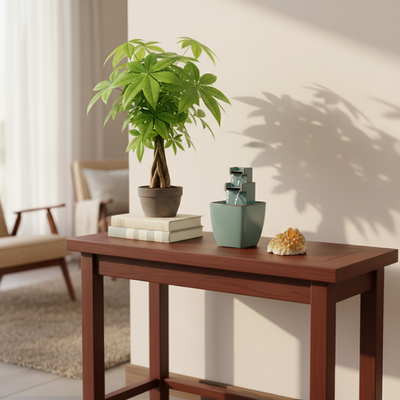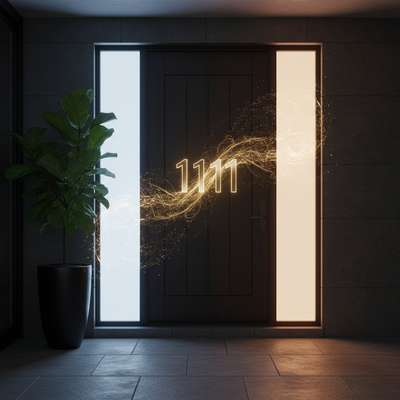The Sacred Space Problem

Can you put a spiritual altar in your bedroom? This is one of the most common questions we get from people living in small, modern homes. Traditional feng shui strongly says no - don't put an altar in the bedroom. This rule isn't about being strict or punishing you. It comes from understanding how different energies work together and showing proper respect. Bedrooms and altars have completely different energy purposes. When you put them together, they can clash and affect both your spiritual connection and your health.
This guide understands your situation and gives you clear, helpful solutions. We know that sometimes the bedroom feels like your only choice. We're here to help you work through this challenge in a respectful and practical way. This article will cover:
- The main feng shui ideas behind this rule.
- Practical solutions if the bedroom is your only option.
- The best other places for an altar in your home.
- A step-by-step guide to setting up a proper, lucky altar.
Main Feng Shui Ideas
To understand why bedrooms and altars don't work well together, we need to look at the basic energies involved. The reasoning isn't random - it's based on hundreds of years of watching how our surroundings affect our energy, health, and spiritual life. When you understand these ideas, you move from just following a rule to making smart, informed choices for your home.
Clash of Yin and Yang
Every space has a main energy signature. In feng shui, we often describe this using Yin and Yang. The bedroom is the ultimate Yin space in a home. Its main purpose is for rest, recovery, intimacy, and quiet thinking. It is passive, dark, soft, and healing. This Yin energy is what lets your body and mind fully recharge during sleep.
On the other hand, a spiritual altar is a focal point of strong Yang energy. It is a place of active worship, prayer, chanting, and connection to the divine, spirits, or ancestors. It represents an active, bright, and powerful link to a higher consciousness. The energy here is vibrant and moves upward. Putting a strong Yang feature like an altar into a deeply Yin space is like trying to have a quiet library inside a loud sports stadium. The energies fight each other. This clash can disrupt the main function of both the space and the object, creating an environment where neither rest nor worship can be fully achieved.
Respect and Purity
The idea of respect is extremely important when housing a sacred object. An altar is a connection to the divine - it is a space held in the highest regard. The bedroom, by its very nature, is a space for activities that, while perfectly natural and healthy, are considered energetically "ordinary" or private. These include sleeping, dressing and undressing, and physical intimacy.
From a feng shui perspective, placing deities or ancestral tablets in an environment where these activities happen can be seen as disrespectful. It is not a moral judgment on the activities themselves but recognizing that the energies don't work well together. The sacredness of the altar is best preserved in a space that is more public, neutral, and used only for respectful activities. Keeping this separation honors the sacred energy you are inviting into your home and ensures the purity of the altar's purpose is not weakened or compromised by the bedroom's very personal functions.
Sleep Problems
The most direct and commonly felt result of this energy clash is poor sleep. The active, watchful Yang energy of an altar can be very disturbing to the calm, Yin environment needed for deep, healing rest. Many people with an altar in their bedroom report feeling restless, having trouble falling asleep, vivid or disturbing dreams, or a constant feeling of being "watched." This is the Yang energy of the altar preventing the people's personal chi from settling down into a restful state.
Furthermore, this energy presence can create invisible pressure on a couple's relationship. The sacred energy, while positive in the right context, can feel intrusive during moments of private intimacy. This can lead to unconscious discomfort or a feeling of being observed, potentially causing strain and reducing the natural, relaxed connection between partners. The bedroom should be a sanctuary for the people living there, and introducing a powerful third energy can compromise that essential function.
The "Must-Have" Situation
We understand that for many people, especially those in apartments or smaller homes, finding a separate room for an altar is a luxury they don't have. If, after careful thought, the bedroom is truly your only realistic option, don't worry. Feng shui is a practical art focused on creating harmony, not stopping you from having what you need. The goal then becomes reducing the negative effects and creating the best possible arrangement. The following steps aren't just suggestions - they are essential actions to create energy harmony.
Step 1: Create Clear Separation
This is the most important step you can take. You must create a distinct, physical barrier between the altar space and the rest of the bedroom. The purpose of this barrier is to symbolically and energetically "wall off" the sacred Yang space from the restful Yin space. When the altar is not being used, it should be completely out of sight. This allows the bedroom's energy to return to its primary Yin function. You have several excellent options:
- A decorative folding screen or room divider. This is an elegant and flexible solution. You can position the screen to create a small, dedicated "nook" for the altar. Choose a design that is respectful and looks good.
- A curtain that can be drawn. Installing a simple curtain track on the ceiling or wall allows you to draw a fabric barrier across the front of the altar. The curtain should be thick enough that you can't see through it and made of a respectful material.
- An "altar in a box" cabinet. This is perhaps the most effective solution. Place your altar inside a beautiful cabinet with doors. When you want to pray or make offerings, you open the doors to reveal the sacred space. When you are finished, and especially before sleeping, you close the doors. This completely contains the altar's Yang energy and is a deeply respectful practice found in many cultures.
Step 2: Smart Placement
Where you place the altar within the bedroom is just as important as separating it. Poor placement can make negative effects worse, while proper placement can help minimize them. The altar should never, under any circumstances, directly face the bed. This is especially true for the foot of the bed, a setup known as the "coffin position," which is extremely unlucky and can drain the energy of those sleeping.
Furthermore, the altar should not be placed against a wall that it shares with a bathroom. The energy of a toilet is considered draining and impure, and placing a sacred object against this wall is highly disrespectful. Similarly, check the floor above - the altar should not be located directly underneath an upstairs bathroom. The ideal spot is a quiet, low-traffic corner of the room, preferably one that does not face the bed or the bedroom door directly. It needs a solid wall behind it for support and stability.
Step 3: The Importance of Covering
If a physical screen or cabinet is not immediately possible due to budget or space, the absolute minimum requirement is to use a respectful cloth to cover the altar. This is a temporary but necessary measure. Choose a new, clean piece of beautiful fabric, such as red or yellow silk or brocade. This cloth should be used to completely cover the altar and its deities or images when it is not being used. It is particularly important to ensure it is covered before you go to sleep and during any moments of intimacy. This act of covering is a sign of respect and serves to contain its active energy, allowing the bedroom to function as a place of rest.
Step 4: Keep Everything Very Clean
When an altar must be in the bedroom, the standard of cleanliness for that area must be raised. The space immediately surrounding the altar is sacred ground. It must be kept extremely clean, tidy, and completely free of clutter at all times. This means no dirty laundry piles, no stacks of books, no trash cans, and no random household items should ever be placed near it. The area should be dusted and cleaned regularly. This care shows respect and helps to keep the energy of the space clear and pure, preventing the ordinary energy of daily life from interfering with the sacred.
A Real-World Solution
Theoretical knowledge is valuable, but seeing how it works in real life provides true clarity. At THE QI FLOW, we frequently see the direct results of improper altar placement. A memorable case involved a client we'll call the Chen family, who had recently moved into a new two-bedroom apartment. They contacted our team because, for months, they had been having ongoing sleep problems, a noticeable increase in marital tension, and a general feeling of unease they couldn't explain.
During our on-site feng shui consultation, we carefully assessed the energy flow of their entire home. The layout was generally good, with no obvious structural problems. However, upon entering the master bedroom, the source of the problem became immediately clear. Due to a lack of other perceived options, the Chens had placed their beautiful ancestral altar on a chest of drawers directly opposite the foot of their bed. It was the first thing they saw when they woke up and the last thing they saw before they closed their eyes.
THE QI FLOW team diagnosed the issue as a severe clash of Yin and Yang energies. The strong, watchful Yang energy of the ancestral altar was in direct opposition to the restful Yin energy required for the bedroom. This setup was constantly beaming active energy at the couple while they slept, causing their restlessness. The feeling of being "watched" by the ancestors was also unconsciously creating a barrier to intimacy, leading to the friction they were experiencing.
Our primary recommendation was clear: the altar had to be moved. We worked with the Chens to analyze their living space. While they didn't have a spare room, we identified a respectful and commanding position in their living room - a quiet corner that did not directly face the front door but overlooked the main family gathering area. This placement allowed the ancestors to "oversee" and bless the household from a more appropriate public space.

After the family carefully moved the altar to the living room and we guided them through a space clearing ritual to reset the bedroom's energy, the results were amazing. Within two weeks, Mrs. Chen reported that they were both sleeping soundly through the night for the first time in months. The tension in their relationship eased, and they described the bedroom as feeling "calm and private" again. This success story is a powerful example of how understanding and respecting the principles of altar in bedroom feng shui is not just an abstract concept, but a crucial part of creating a truly harmonious home.
Finding the Perfect Location
If you have decided that the bedroom is not the right place for your altar, the next step is to identify a more lucky location. The goal is to find a space that is respectful, has good energy, and aligns with the Yang nature of an altar. Here are the best alternatives.
The Living Room
For most homes, the living room or main hall is the best choice for an altar. This space is typically the heart of the home, a public area where the family gathers and guests are received. It has an active, Yang energy that works well with an altar. Placing the altar here allows its blessings and protective energy to extend over the entire household.
The ideal placement within the living room is in a "commanding position" - a location where it has a clear, open view of the room but is not directly in a high-traffic path. It should be placed against a solid wall for support. Avoid placing it where it directly faces the main entrance, as this can cause the incoming Chi to rush at the altar too aggressively. A slightly offset position is better.
A Dedicated Study
A home office or study can be another excellent location, provided it is a quiet and respectful space. The scholarly and focused energy of a study can complement the spiritual energy of an altar. It offers some privacy for worship without the energy conflicts of a bedroom.
However, this comes with a warning. If the home office is a place of high stress, chaotic paperwork, or frantic business calls, it is not a suitable environment. The space must be kept clean, organized, and relatively peaceful. The altar should not face a cluttered desk or be surrounded by symbols of stress. If the study is a calm and orderly space, it can be a wonderful home for your sacred objects.
A Specific Prayer Room
The ultimate and most lucky solution is, of course, a dedicated prayer or meditation room. If you are fortunate enough to have a spare room, no matter how small, converting it into a sacred space is the highest form of respect you can show. This room's sole purpose becomes spiritual practice. This creates the purest possible environment, free from the conflicting energies of sleeping, eating, or working. In this dedicated room, you can set up a more elaborate altar and create a true sanctuary for your spiritual life, a place where you can connect deeply without any external energy disturbances.
Setting Up a Lucky Altar
Once you have chosen the best location, setting up the altar correctly is key to activating its positive energy. While specific traditions may vary, several universal feng shui principles apply to any altar. Remember that intention and respect are the most important elements you bring to this process.
-
Choose the Right Height. The surface of the altar should be at a respectful height. As a general rule, it should be at least chest-high when you are standing in front of it. Placing deities or ancestors too low, such as on a low coffee table or near the floor, is considered disrespectful as it forces you to look down upon them. A dedicated altar table or a high-standing cabinet is ideal.
-
Ensure a Solid Backing. The altar must always be placed against a solid wall. This provides a sense of stability, support, and protection. Never place an altar against a window, as energy is constantly moving and escaping, creating instability. It should also not be placed "free-floating" in the middle of a room or against a temporary partition. A solid wall acts as a mountain, grounding the altar's energy.
-
Avoid Unlucky Locations. There are several key locations to avoid. Never place an altar directly under an exposed overhead beam, which creates oppressive energy. Do not place it under a staircase, where the energy is chaotic and trampled upon. As mentioned before, it must not share a wall with a toilet or a kitchen stove. The toilet has draining, unclean energy, while the stove has fiery, chaotic energy, both of which conflict with the serene and sacred nature of an altar.
-
Gather Essential Items. A basic altar setup often includes a few core components. Your arrangement should be balanced and uncluttered.
- Statues or Images: The central figures of your devotion (deities, Buddhas, or ancestral photos/tablets).
- Incense Burner: Placed in the center, used for fragrant offerings. The ash should be cleaned out regularly.
- Offerings: Fresh flowers (representing impermanence and beauty), fresh fruit (representing abundance), and a cup of fresh water (representing purity) are standard. These should be refreshed regularly.
- Candles or Lights: Representing wisdom and illumination. These should be placed symmetrically.
-
Maintain with Regular Care. An altar is not a static display - it is a living space of energy. It requires consistent care and attention. This includes daily or regular tidying, cleaning away dust and old incense ash, replacing water daily, and changing out flowers and fruit before they begin to wilt or spoil. This act of regular maintenance is a form of active devotion and ensures the Chi of your altar remains vibrant, clean, and lucky.
Do's and Don'ts Quick Reference
For easy recall, here is a summary of the most important guidelines for altar feng shui. This table provides a clear, scannable reference to help you make the best choices for your sacred space.
| DO ✅ | DON'T ❌ |
|---|---|
| Place the altar in a public, respectful area like the living room. | Never place an altar in the bedroom if you can avoid it. |
| Position the altar against a solid wall for support. | Don't place it under a window, beam, or staircase. |
| Keep the altar and surrounding area exceptionally clean and clutter-free. | Don't let the altar face a bathroom, kitchen stove, or the foot of a bed. |
| Use a screen or cabinet to separate it if it must be in the bedroom. | Don't point sharp objects or place clutter facing the altar. |
| Refresh offerings like water, fruit, and flowers regularly. | Don't use wilted flowers or spoiled food as offerings. |
Creating Harmony
Ultimately, the practice of feng shui is about creating harmony between you and your environment. The guidelines for altar placement are not meant to be restrictive rules but rather a map to help you cultivate a home that supports every aspect of your life. The core principle is simple: the bedroom is a Yin sanctuary for rest, and an altar is a Yang center for devotion. Keeping these powerful energies in their proper domains honors both.
By understanding the energy principles of Yin and Yang, respect, and purity, you can make conscious choices that enhance your well-being. Whether you are finding the perfect spot in your living room or carefully reducing the challenges of a bedroom placement, your intention is what matters most. We encourage you to apply what you have learned here to create a space that is not only beautiful but also energetically balanced - a home that deeply supports both your spiritual practice and your personal peace.







